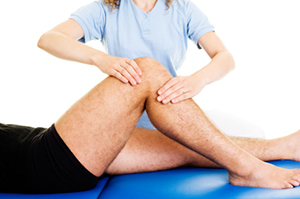Jumper's Knee
Jumper's Knee or Patellar Tendonitis is an injury that affects the tendon, which connects the kneecap (patella) to the shinbone (the tibia, which is the inner and thicker of the two bones of the leg, situated between the knee and ankle, the thinner bone being the fibula). Tendons are fibrous connective tissues, which attach muscle to bone. The patellar tendon is crucial to the way in which leg muscles are used. It helps muscles extend the knee as in when kicking a ball, running uphill, jumping up in the air or doing the flutter kick in swimming. Patellar Tendonitis is most common in athletes whose sport involves frequent jumping, such as basketball and volleyball; hence, Patellar Tendonitis is commonly known as Jumper's Knee. It is usually caused by overuse or repeated eccentric contractions of the quadriceps, such as which occur when landing from a jump on a hard surface, and hence the name Jumper's Knee
Cause or Possible Risk Factors
- Overdoing an activity such as running, jumping and kicking, all of which place continuous stress on the patellar tendon when it is not strong enough to handle the excessive load
- Jumper's knee occurs in many types of athletes but is most common in sports such as track and field (particularly high jump), gymnastics, basketball, volleyball, or soccer, which require explosive jumping movements
- Constant jumping, landing, squatting, and changing direction can cause strains, tears, and damage to the patellar tendon
Symptoms
- Pain at the bottom and front of the kneecap especially when pressing in or palpating
- Pain and/or swelling below the kneecap
- Pain in the quadriceps muscle
- Pain that is especially noticeable when sitting, straightening the leg, pressing against the tendon, or going up and down stairs
- Pain that increases with physical activity
- Stiffness of the knee, particularly while jumping, kneeling, squatting, sitting, or climbing stairs
- Weakness in the leg or calf
- Warmth, tenderness, or swelling around the lower knee
- Balance problems
For more information on the conditions we treat and services we offer, or to book an appointment please call us on 416 489 5313 (Finch) / 416 604 4404 (Jane) or email us at info@physiowell.ca.














